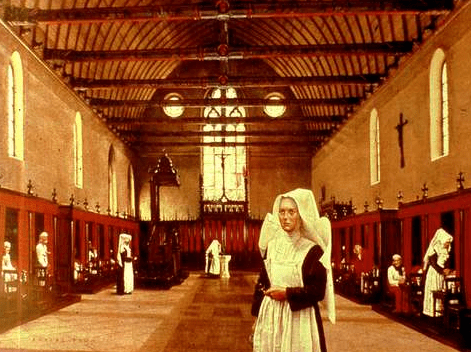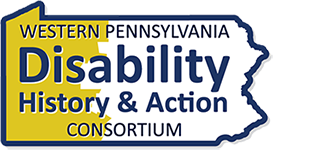
Workshop Information
This workshop was held on Wednesday, September 11 and Thursday, September 12, 2024.
About the Workshop
Using about six hundred images, this two-part presentation documents how major human service concepts and practices developed over time, from ancient informal, voluntary, unpaid personal helping forms to the largely commercialized patterns that we see today. Illustrations of human service settings, of service practices, and of works of art are used to show what the service patterns and assumptions were at a given time, and how and why they changed.
Day One sketches early–indeed ancient–service patterns, and shows that the history of human services of all types is inextricably interwoven with care for the poor and residential service provision. The presentation then traces human service practices into the late Medieval period, and the dramatic impacts on services of political, economic, cultural, and other changes in the 15th, 16th and 17th centuries that led to much segregation and brutalization of the people served.
Day Two explains how services became alienated from valued cultural roots and analogues they once had, and how the people served began to be interpreted as menaces and treated accordingly. The presentation also explains the impact on services of the materialistic worldview that arose in the 18th century, leading to further brutalization. Then, many lessons from this historical review are spelled out.
The material is very sequential, each part building on what was covered previously. Therefore, only those who have attended Day 1 will be admitted to Day 2.
One main purpose of the presentation is raising of consciousness, and people who attended this presentation in the past have remarked that it fundamentally altered how they perceived many human service practices, and that it helped them to understand–often for the first time–some of the things they had witnessed, or of which they were a part, or to which they had contributed.
Format
For each day, the morning and first part of the afternoon are devoted to presentation, which is very visual: lots of pictures and overhead transparencies. This is followed in the latter part of each day by an open-ended questions-and-discussion session for the remainder of the afternoon. Lunch and light refreshments are provided, and there are short breaks in mid-morning, mid-afternoon, and for lunch each day.
Who Should Attend
This workshop can help anyone gain a better understanding of where many service practices that are taken for granted come from, the service challenges that confront them, some of the dangers that lurk everywhere, and what sorts of service patterns to strive for. This workshop is therefore relevant to everyone who plans or provides or works in service of any kind to any population, whether such service is formal and organized or informal. This includes: family members, members of circles of support, advocates, direct service workers, clinicians, service funders, board members, managers, agency executive directors, administrators, policy-makers, and analysts.
Presenter Bios
Susan Thomas
Susan Thomas is a native of Pittsburgh, Pennsylvania, and received both a bachelor’s and master’s degree from Syracuse University (1973, 1979). For almost 40 years, she worked at the Training Institute for Human Service Planning, Leadership, and Change Agentry at Syracuse University in Syracuse, New York, under the direction of the late Professor Wolf Wolfensberger, and assisted him in developing and presenting numerous Training Institute events on many topics, including on the history of human services. She is the co-author (with Wolfensberger) of the PASSING instrument for evaluating service quality, and the author or co-author of numerous articles on Social Role Valorization (SRV) and related subjects, including frequent contributions to The SRV Journal. Her service involvements have been primarily of a voluntary and informal nature. Currently, she is continuing the work of the Training Institute.
Thomas Malcomson, PhD
Thomas Malcomson, PhD, was for 32 years a professor in the School of Liberal Arts and Sciences, at George Brown College in Toronto, Ontario, Canada, where he taught courses in Introductory, Social, and Developmental Psychology. He was also a co-author of a Life-Span Development text. Due to his interest in the plight of people marginalized in society, he has studied the history of eugenics and genocide, and has taught courses on those topics as well. Prior to teaching, he worked in human services, including serving intellectually and physically disabled people. He has also contributed to a number of issues of The SRV Journal.
Thomas is a member of the Southern Ontario Training Group, which organizes SRV, PASSING, and other workshops that continue the teaching of the late Prof. Wolf Wolfensberger in Ontario. He is a member of The Personalism Roundtable, a study and teaching group who teach on the Philosophy of Personalism as applied to human services.
Jack Yates
Jack Yates has been a teacher of human service staff and families for over forty years, largely in the developmental disabilities field. His teaching derives from the ideas of Dr. Wolf Wolfensberger, his principal teacher, and focuses on such topics as combating the devaluation of impaired people and other marginalized social classes, lessons–good and bad–from human service history, and making connections for excluded people with the community. He has also done much work in the development of person-centered planning. Jack taught service workers for several decades and in several states, and has also taught people in church ministry, including at the Harvard Divinity School. He and his wife Marcia live in Sharon, Massachusetts.
About the Gather for Change Event Series
The “Gather for Change” project will feature a series of six free educational and empowering events, all aimed at advancing awareness of critical topics for people with disabilities, their families, disability activists, and anyone interested in disability rights and history. Five of the events will be held virtually and one event held in person. This project is funded by the Pennsylvania Developmental Disabilities Council.


